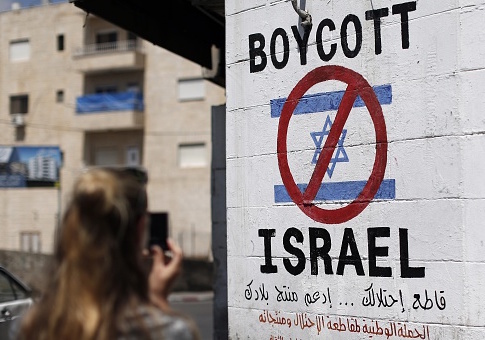Anti-Israel boycott initiatives at multiple North American universities have prompted heated debates between students and faculty in recent weeks.
Nine faculty members at the University of Maryland (UMD) published an open letter Thursday asking the student representatives behind a pro-boycott, divestment, and sanctions (BDS) resolution currently moving through the student government legislative process, "Do [you] want to help destroy the American alliance with Israel?"
"Rather than laud [U.S.-Israel] connections as part of a praiseworthy alliance among democracies, it casts aspersions on them in an effort to break that alliance and isolate Israel," write the faculty, who are associated with the history, kinesiology, computer sciences, classics, mathematics, women's studies, and engineering departments.
The faculty takes issue with the exclusion of the word "Israel" from the motion's title—"A Resolution to Promote Human Rights by Divesting from Companies that Profit from Investments in Palestine"—writing that such a move "illustrates that the purpose of the resolution is to eliminate the state of Israel."
The pro-BDS students have said they are walking in the footsteps of Martin Luther King, Jr, quoting remarks from King about fighting for justice. They do not note King's 1968 comments that "we must stand with all of our might to protect [Israel's] right to exist, its territorial integrity," and that he saw the country as "one of the great outposts of democracy in the world."
The motion draws on the university's social justice culture, like its status as a "sanctuary campus" for undocumented students, in its appeal to the campus community to support the claim that tens of companies "profit from violating the universal rights 'to life, liberty, and security of person,'" by doing work with or in Israel. Companies named include Hewlett-Packard, Caterpillar, Motorola, Boeing, General Electric, and Lockheed Martin, all of which are frequently invoked in student BDS language.
UMD student Moshe Klein, who has written multiple op-eds in the student paper making the anti-BDS case and plans to speak out at next week's vote, said there are a "couple of strong anti-BDS people in high positions in [the student government]," including the speaker, but that he believed the motion would not ultimately pass.
The fact that BDS campaigns like this one are "implemented only against Israel and no other countries" makes Klein sense "an anti-Semitic element that makes me feel severely uncomfortable."
The motion was cosponsored by two student government representatives, supported by Students for Justice in Palestine.
Neither sponsor responded to requests for comment by press time.
UMD told the Washington Free Beacon, "The University of Maryland's Student Government Association considers many issues and resolutions. As this resolution is at a very early stage of the process, it would be premature for the university to comment.
"The University of Maryland is proud of our vibrant Jewish community on campus. We have been clear in our commitment to support our Jewish students, faculty, and staff, and to our robust scholarly portfolio of Jewish studies and academic collaborations and exchanges with Israeli institutions."
The university president has previously opposed boycotts of Israel.
At the University of Michigan-Ann Arbor, a similar motion has been introduced for the tenth time in 15 years, every one of which has been rejected by the student government.
The Michigan campaign, led by Students Allied for Freedom and Equality (SAFE), demands the school "divest from companies that profit from Israel's violations of Palestinian human rights."
SAFE announced the renewal of its BDS efforts nearly a year after its last failure.
During a previous campaign, SAFE called for the removal of a Jewish student representative who criticized their erection of an "apartheid wall" on campus, activists' term for the security fence Israel built to contain terror threats. SAFE's display, like those on other campuses, have included widely discredited maps of Israel and misquoted, wrongfully attributed quotes from Zionist leaders.
The Dearborn campus of the University of Michigan has successfully passed BDS resolutions, most recently in March 2016.
Meanwhile, in Canada, there have been nine consecutive failed attempted to pass a BDS resolution through university student governments over the last two years.
A failed campaign at the University of Ottawa was sprung last Friday, hours before the observant Jewish community, a demographic often active in BDS debates, would be off the grid to keep Shabbat.
The director of the campus Jewish Hillel center said the move was not totally unexpected, as just weeks before there was an attempt in the student government to revoke the official club status of Hillel and the Israel Awareness Committee, which would have seriously damaged both regular Jewish activities and pro-Israel programming.
